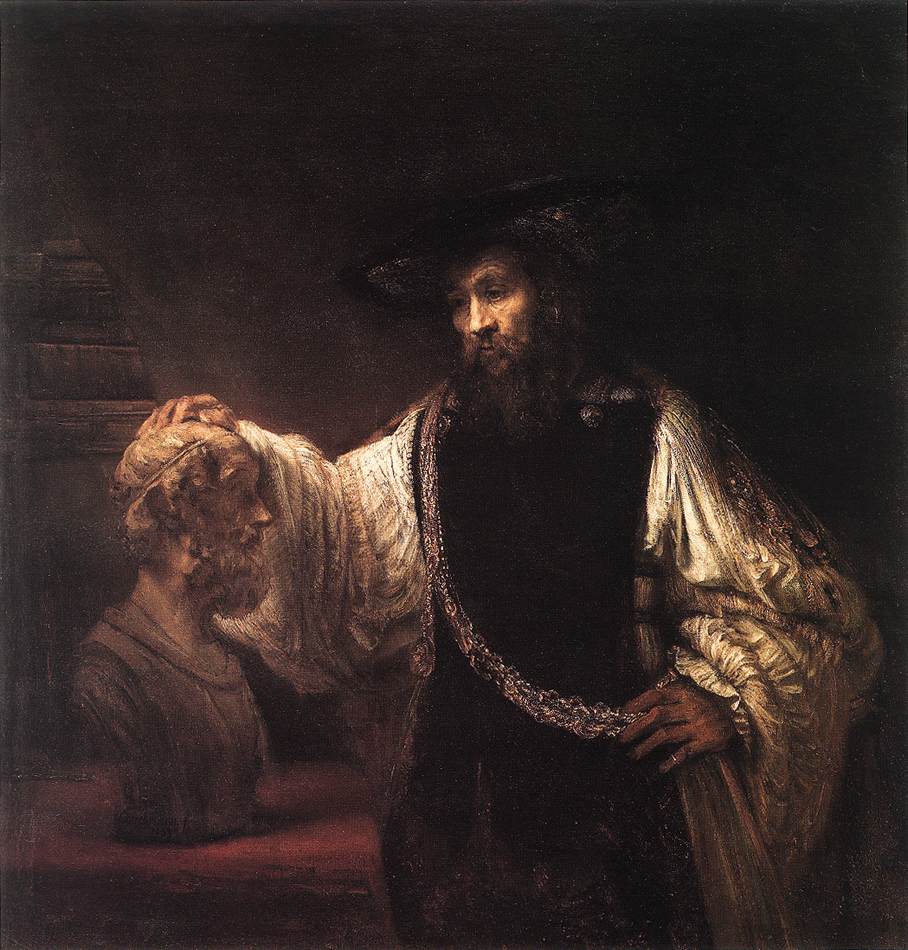
It's funny. I was beginning to think of Rembrandt as an OOO kind of a painter guy, when along comes Frances Madeson with this marvelous comment on Levi's blog. Thank heavens Levi is blogging again. What was I to do without my daily fix? You can get a pretty decent education for nothing you know by going there... Anyway here's Frances's observation:
Before today I wouldn’t have up and thought, oh, Rembrandt’s critiquing Aristotle’s reification critique of Plato. But costuming him out of period, out of his own time, and in the attire of the Dutch expansionist moment? There’s an intensely political rebuke there, I think. For being too poor a student of Plato and too good a teacher of Alexander. Foregrounding historical consequences via anachronistic fashion statement.Now I'm going to read this a little bit upside down but what the hey. Lust, that's the right word. Tantra sees the world as made out of not billiard balls but lust. I like this idea of a blind, tactile, haptic approach to objects—reification seems to have to do with vision and the fetishistic properties thereof. But if, as Blake says, vision is really a form of touch (as are all the senses), all we do is feel our way along in a totally ingenuous way, without the possibility of distance. What fuels Alexander, then, isn't lust for objects, but desire for dominion.The official rap on this painting is that it’s a comment on material reward, selling out, purity in art, etc. But as much as I love the Metropolitan and respect many of its painting curators, I don’t think so; not now; in fact those comments seem impossibly glib.
Rather, I suspect that Rembrandt painted an epic internal struggle, an intellectual and moral one with its measure of shadow and pain, pain derived from the act of rejecting a teacher’s valuable lessons, as Aristotle did to Plato. Billowing sleeves not as literal material excess, but rather an internal canvas on which to throw the light on this very issue of patterning; and to ask what if? What if Aristotle had been a Platonist and not an Aristotelian in this regard?
One hand on Homer’s head –that great patterner of language and narrative–the other on links in the chain. It’s subtle, but Rembrandt has him groping, feeling his way, almost as if Aristotle was as blind philosophically as Homer was physically.
What fuels the kind of greed that propels a mercilessly bloody and violent campaign such as Alexander’s, such as our own vampirish adventures, if not lust for the goddamned things themselves?
There's something so earthy and warm about Aristotle, isn't there? (I speak up here for Aristotle rather than for cold, reified/reifying Plato.) Something soft and fallen and crumbly and hypocritical (see my many posts on that). Madeson identifies Aristotle as the hypocrite here, caught between the judgment of Plato and the dominion of worldly lords, feeling the bumps on Homer's head like a phrenologist, in that wonderful Rembrandt darkness, a darkness that is never a void but is always the warm presence of some object.
Thank you for the brilliant and beautiful post. I was wondering if you were familiar with Joseph Heller's book “Picture This”? It is an excellent meditation on the dialogue between Rembrandt, Plato, Aristotle and Homer.
ReplyDeleteNo Matthew--thanks, I shall look at it at once.
ReplyDelete